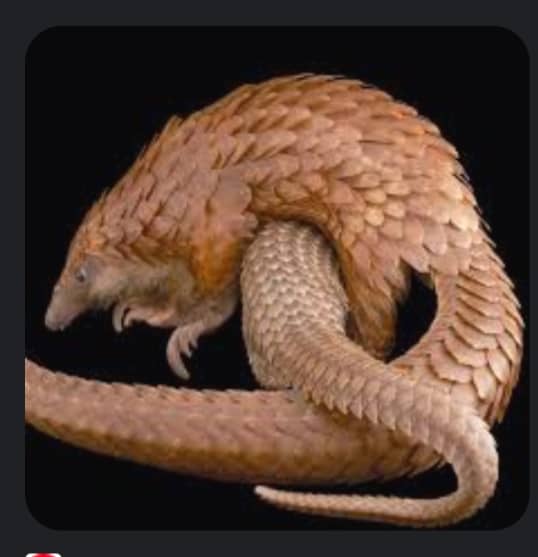A major milestone has been recorded in the fight to curb the trafficking of pangolins in Nigeria and Africa at large.
This follows the release of findings of a research work which among others reveal the hotspot and trading routes of traffickers of the endangered organism across Africa and Asia.
The project which took seven years to complete is a collaborative research endeavor involving renowned Nigerian conservationist, Dr. Excellence Akeredolu of the University of Lagos, along with a group of researchers from the University of California, Los Angeles, as well as scientists from various regions in Africa and Asia.
Dr. Excellence Akeredolu holds the position of Associate Professor at the Department of Zoology, University of Lagos. Additionally, he is an esteemed member of the IUCN Pangolin Specialist Group and serves as the Director at Large for the Society for Ecological Restoration USA.
Speaking during a chat in Lagos, Dr. Akeredolu expressed optimism that the findings would be a useful tool for the Nigerian Customs, Immigration Service and other law enforcement agencies and stakeholders in tracking and intercepting traffickers of not only pangolin but also other wild species that the nation is under obligation to protect.
Akeredolu stressed that due to the lack of proper training of law enforcement agents and failure to equip them with the latest technologies, it has been an uphill task identifying the origins of wildlife species and their body parts, concealed and trafficked within the country’s borders.
“Pangolins are usually mixed with other goods. Some are mixed with scales of fish and those things make it difficult for law enforcement agents to determine. The law enforcement agents in Nigeria are not well equipped with the latest technology and capacity to differentiate and track the origin of the confiscated pangolin. So, all these things, together with lack of funding have hindered efforts of law enforcement agents in tracking trafficked pangolins”, said Akeredolu.
Akeredolu noted with happiness that the released research findings had provided insights that would help law enforcement agents to track and locate the origin of seized pangolin products, necessary for curbing the illegal trade.
According to him, “Over the years, efforts have been made to track the route and source of Illegal trade in pangolins. About two years ago, a consignment of pangolin was intercepted in Nigeria by the Customs. To date, the origin of the scales has been very difficult to track.
“Pangolin products are often brought through illegal hunting and trafficking, which means they lack proper documentation and traceability.
“The absence of clear paper on that made it difficult to establish the exact source of the origin of the confiscated items. Illegal wildlife traders operate through a complex network which makes it difficult to track. Also, our border is porous, this made it very easy for people to bring in and take out pangolin without law enforcement agents being able to do anything about it”, he said
The lecturer however stressed the urgent need for the country to beef up surveillance and security around its borders to make them less porous, thereby preventing traffickers from turning them into transit routes for endangered wildlife species, especially pangolin.
Dr. Akeredolu who identified Pangolin as among the most trafficked and traded wildlife globally, despite being critically endangered, identified some of the factors responsible for it including its high cost which he said is about 250 dollars.
He pointed out that it has been discovered that because the organism is very expensive on the Black Market, persons alleged to be terrorists sell it in exchange for weapons and ammunition, which is among the major reasons no efforts should be spared in the fight against its trafficking.
Explaining further he said, “All the 8 species of pangolin found in Asia and Africa are threatened and endangered, therefore international efforts are being made to protect and conserve them.
“Pangolin over the years has become one of the major victims of international trade. Some of the factors driving trade in the animal include its use for traditional medicine and the high value of pangolin in the black Market, which is 250 dollars. Even the terrorists are selling the animals to exchange them for weapons. Some people also believe that it is delicious, so they use it as meat”, he said.
“Pangolins are a critically endangered species and therefore it is forbidden by law for people to use these animals for all sorts of things. The animals are found in various habitats in Africa- rainforest, savannah, grassland, and even rocky areas, added Akeredolu.
The research work published in the Science Journal revealed a progressive decline in illegal trafficking of pangolin in West Africa, but a spike in Central Africa.
These changes in trafficking patterns, the team said could represent a response to increased enforcement and declining pangolin population in West Africa. They also attributed it to the possibility of traffickers taking advantage of new and convenient trade routes.
The report reads in part, “By sampling 32 confiscations seized between 2012 and 2018 representing over 100,000, the team mapped pangolin hotspots documented changes in poaching pressures over time”.
“Next, we analyzed data on pangolin trafficking incidents to connect poaching hotspots with common trafficking routes to market. Our approach enables the monitoring of changes in poaching in near real-time, allowing for targeted and more effective anti-poaching measures.
“Networking mapping of African pangolin seizures identified Nigeria as the highest-volume transit hub in Africa, where traffickers amass pangolin scales before shipping them overseas.
“Nigeria’s seizures are more comparable to those in non-African transit locations, such as Hong Kong, China, and Turkey. However, data from public records of illegal activities are subject to major biases such as law enforcement efforts and media interest in large seizures.
“Our results provide a geographically explicit understanding of where global trafficking networks threaten white-bullied pangolins most. However, our study and past work suggest that these routes will likely change over time and continuous monitoring is necessary to detect changes in trafficking patterns.
“Testing seizures confiscated over just 7 years, 2012-2018, enabled us to detect changes in the origins of trafficked pangolins. Early on, poaching activity was confined to West Africa before shifting to Central Africa more recently.
With over half a million African pangolins seized from the illegal wildlife trade in the time frame, unsustainable exploitation seems all but certain”.
Concluding it says “Over time, the last decades, the Asian pangolin population has declined due to demand from unsubstantiated use in traditional medicine, at the same time, poaching of African Pangolin has increased rapidly.
“Identifying the source of poached pangolin and the path of transit of pangolin scales could greatly inspire our ability to reduce illegal trade of these animals, which at current rates lead to their extinction. They found a shift from west to central Africa over the last decade and further identified trafficked pangolins and the result showed changes in trafficking hotspots over time”.






2 Comments